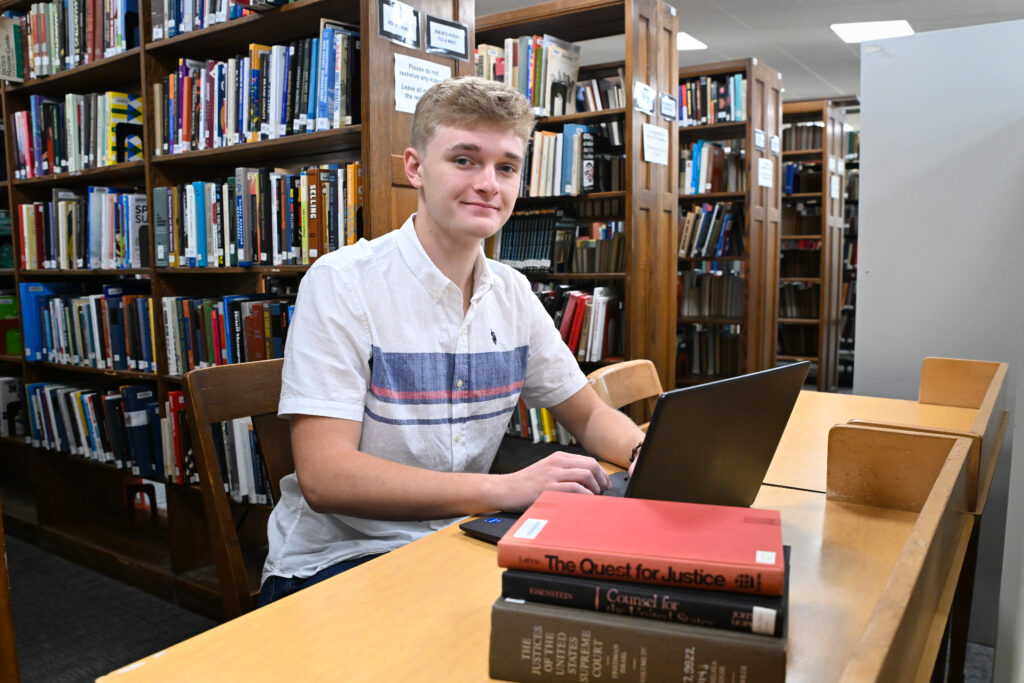
Story: Lisa Sollie | Photo: Cody Ingram
When Samuel Johnston first arrived at the University of West Alabama, football was his focus. But UWA’s new politics and justice degree kept the Tuscaloosa native on campus after his days of playing football were behind him.
Before transferring to UWA, Johnston spent his freshman year studying political science at the University of Alabama. But his interest in politics began even earlier through his involvement with TeenPact Leadership Schools, a Christian nonprofit that teaches students about leadership, citizenship, and the inner workings of government.
“Through TeenPact, we studied the branches of government and spoke with representatives from each—including Governor Kay Ivey, former Secretary of State John Merrill, and former Alabama Supreme Court Justice Tom Parker,” he recalls.
His passion deepened at Teen Pact Judicial, a summer program hosted by Liberty University’s School of Law. Johnston was one of just 200 students nationwide to attend, where he earned an award for oration while arguing constitutional law.
It’s that same passion UWA’s politics and justice program aims to nurture—one that Johnston now hopes to lead him to law school and a career that balances conviction with leadership.
“I’m a believer, and that’s a big part of my life,” he says. “I honestly hesitated at first to pursue law school, because I had always heard it’s hard to balance your faith and a healthy marriage as an attorney. But several men in my church that I admire are lawyers, and one is even a judge. Seeing how they juggle both was very influential in my decision.”
One of those mentors is Alabama Supreme Court Justice Chris McCool, who helped Johnston connect with a local attorney. Johnston will begin working at the law office in early September, while continuing his coursework at UWA.
“I’ve spoken with Justice McCool about the state supreme court, that really interests me down the road. I know that’s not a position you walk into, but I feel very blessed to be surrounded by great role models and be able to learn more about law while I’m still a student.”
Dr. Jacob Snyder, associate professor of political science, envisions the new degree as a steppingstone for students interested in law, advocacy and public service. The curriculum, he explains, is designed to equip students with critical thinking and problem-solving skills to navigate political systems, legal frameworks, and issues of global justice, something Johnston truly appreciates.
Johnston says UWA’s small campus and tight-knit learning environment have also been a major part of his success.
“I feel like I’ve learned more here in the smaller setting. My professors are approachable, and I can get help to reach my goals,” he says. “Dr. Snyder has even offered study guides for the Law School Admission Test, which I’d like to sit for the end of this year.”
He also plans to connect with another faculty member known for helping students polish their essays for law school applications.
Snyder believes UWA’s politics and justice program offers something different from traditional political science programs: real-time debate, open discussion of current events, and practical preparation for careers in law and public service, something he says was missing in his own undergraduate experience.
“Students want to have these conversations,” Snyder says. “They just need the space and the encouragement to start them.”
Johnston agrees. “I’ve really enjoyed getting to talk and debate with other students in my classes. That approach really helps me learn better.”
To further expand the program, UWA recently welcomed Dr. Emma Slonina, a visiting assistant professor of political science specializing in education in modern political philosophy whose addition brings another layer of depth to the growing program. She will be teaching courses on historical trials, modern political thought, and political science research methods, strengthening opportunities for students interested in law, governance, and justice.
Now in his junior year, Johnston is already preparing to take the LSAT for the first time at the end of year and plans to apply to several law schools, mostly in Alabama but possibly out of state as well.
Wherever he lands, Johnston is confident that constitutional law is his calling, whether that means arguing cases before the state supreme court, working as a judge someday, or serving in Washington, D.C. as part of a legislative team.
“Only God knows where I’ll end up,” he says.